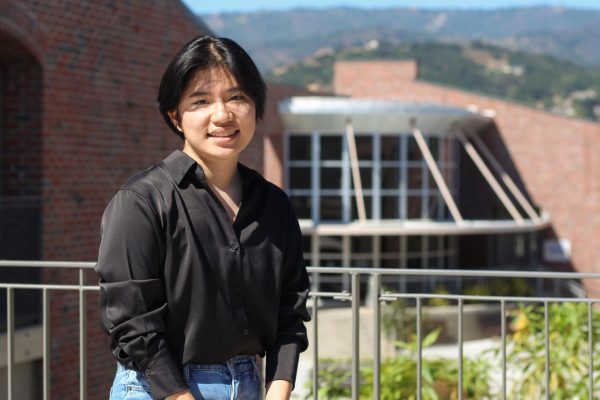The U.S. is currently experiencing a religious recession specifically with Christianity, one that could change the religious landscape that has been a core part of American identity since its founding. According to a 2020 study from Pew Research Center, 69% of Americans currently identify as Christian — which seems like a big number until it’s revealed that the number was as high as 90% 50 years ago. In fact, the Christian majority within the U.S. might disappear by 2070.
With much of the younger generation moving away from Christianity, senior Bradley Dulay feels “separated from [Christianity],” despite attending church throughout his childhood. Dulay’s father is a devout Christian and their family would attend church every Sunday until COVID-19 interrupted this routine. This loss of community was part of what jump-started his disconnect with Christianity.
For those like Dorcas Chang, Youth Director at Home of Christ Church Six, she believes that faith communities like churches are an essential part of being Christian. But in today’s day and age, Chang has observed churches struggling to find pastors, especially in areas with high rent like the Bay Area where people within the community are moving to an area where the cost of living is lower. She also believes the individualistic nature that many in the Bay Area hold doesn’t lend itself to the community that faith typically tries to cultivate.
“Before we were [very] reliant on our community, [but] lately, it just feels like there’s less reliance,” Chang said. “People don’t feel the need to go to find a community. They don’t go to church. I feel like a lot of [people] in the Bay Area [want to win] that rat race, like work, work, work.”
Senior Sophia Lu, who was part of a Catholic congregation when she was younger but is no longer a believer, also gradually stopped attending church. She was baptized when she was born and attended church every Sunday, although she notes that her family was not “very religious.” Lu explained how the community offered the stability that she enjoyed as a child, but she eventually reached an age where that stability was no longer necessary.
“Growing up, I went to Sunday school and obviously everyone there is really nice,” Lu said. “I think that sort of supportive or positive environment was good to have as a child. And I remember they would say that God is good all the time or God is everywhere. I guess that as a child, that naturally makes you feel safe, because you believe that there’s this being that’s always there to protect you … But I think as I grew older, I just naturally started drifting away from [that thinking].”
Another one of the main reasons Chang outlined for the decline in religion is the lockdown that occurred during COVID-19. She says the pandemic generated issues that wouldn’t have come up otherwise, most notably distancing many people from the faith communities they were a part of.
“People go through a lot, especially because of COVID,” Chang said. “You have trauma and you have misdirected growth and you can’t heal on your own. We were made to heal through … God, but God also gave us community, and so you really need that supportive [community] to help you when you’re going through such tough issues.”
The pandemic caused many churches to cease in-person meetings, instead moving toward online or livestreamed sermons. As a result, the community that Chang emphasizes as being so essential to a strong faith was no longer as accessible. Dulay had a similar pandemic experience, where he began by attending online service consistently before his attendance gradually tapered off. Even when in-person service resumed, Dulay decided not to return to church.
Apart from COVID-19, Chang points out how many big life changes that shift one’s routine — such as going to college — creates a change in community that affects people’s faith. Faith is left more vulnerable, and she explains that it’s up to the person to seek out a new community to grow.
“[For some people], they only came to church because it was part of their identity as a kid and their community,” Chang said. “It was just something that was a habit. It’s honestly based on how authentically they engage in their faith when they’re a kid, because if they didn’t [engage], it’s going to be very hard for them to be motivated to find a Christian company when they [leave that community].”
Sophomore Jenna Bergendahl, who’s a nondenominational Christian, has observed this in her own life as well, especially when she was younger. As a child, she didn’t have a good understanding of what it meant to go to church; rather, she went for the snacks and friends it afforded. When she grew older, Bergendahl struggled with the existence of God and the Bible as she strove to gain a more critical and deeper understanding of her faith.
“I’m such an overthinker … [and] I feel like that [has] been what’s driven certain doubts,” Bergendahl said. “It’s hard to believe, with our society and the world, [that] the whole Bible is true. And I don’t think any one of us would fully believe that the Bible is true no matter if you’re Christian or not.”
Lu says one of the reasons she is no longer religious was her discomfort with some of the beliefs some people in the church held. She recognizes that not all churches or believers hold the same beliefs, but that she was still uncomfortable with the fact that there were, for example, some homophobic churches. As a result, she says it was “the people that follow the religion that made [her] turn away, not just the religion itself.”
For Dulay, the lack of connection he feels with God is what feeds into his increasing disbelief. As a result, he feels “separated from [Christianity]” and no longer identifies as a Christian, though he still prays to God before meals and bed.
“I’ve been praying to God every night, but when I’m in … [a] time of need, not [necessarily] something drastic, [I’m] like, ‘Oh God, could you help me get through something?’” Dulay said. “But I usually don’t end up getting [anything] from that, so that’s kind of dwindling my belief.”
In contrast to both Lu and Dulay, Bergandahl ultimately says the positive impact Christianity had on her life trumped her doubts. In her experience, when unfortunate situations arise, God’s promises and what the Bible teaches bring her hope that things will get better no matter how bad the circumstances. Although she occasionally experiences periods of time where her belief is tested, Bergendahl describes how these doubts now actually provide growth opportunities.
“If every one of my days is good, then He’s not gonna allow me to grow,” Bergendahl said. “Because I know for a fact that every single bad thing I’ve been through, God has been with me and that he’s made it right. He’s proven He’s good in all my circumstances whether they’re good or bad.”
Similar to Bergendahl, Lu acknowledges that Catholicism taught her many good values. However, she specifies that these are values she believes everyone should follow, not just Christians, such as not to lie or to be kind. Ultimately, although Catholicism was once part of her life, she notes that its originally minimal presence means she isn’t particularly conflicted by the lack of it in her current life.
“If I grew up in [a] more religious household I guess religion would have been a more important thing in my life,” Lu said. “I don’t know how I would have turned out [if] that was the case but I wouldn’t have turned out the way that I am [now].”













